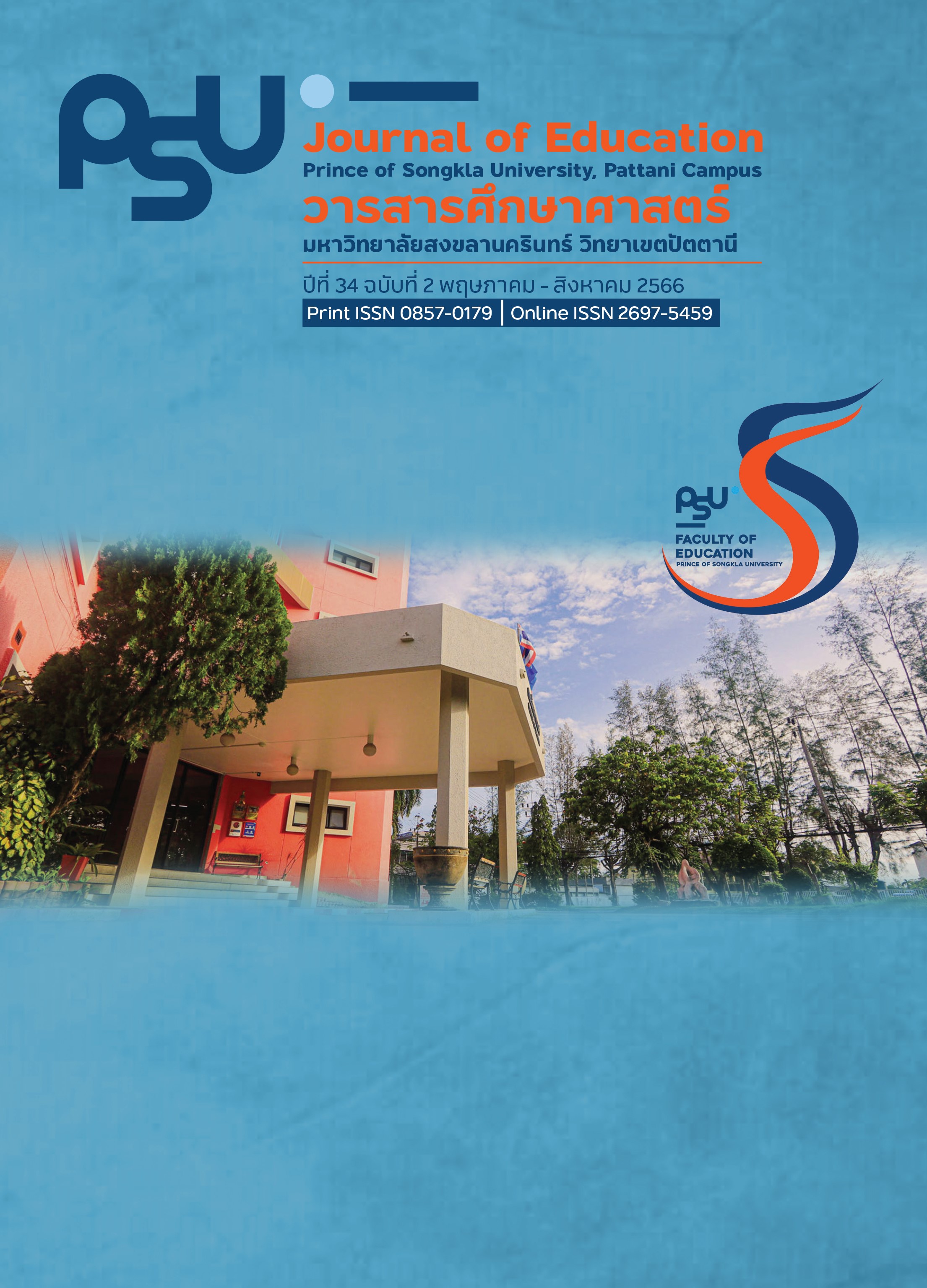ผลของการฝึกอบรมเชิงจิตวิทยาและการเข้าร่วมกลุ่มการปรึกษาเชิงจิตวิทยาด้วยกระบวนการจิตตปัญญา และหลักคำสอนอิสลามเพื่อเสริมสร้างพลังสุขภาพจิตแก่ครอบครัวหญิงมุสลิมที่ดูแลเด็กพิเศษ ในพื้นที่จังหวัดชายแดนภาคใต้
Main Article Content
บทคัดย่อ
งานวิจัยนี้เป็นการวิจัยทดลอง (Experimental Research) แบบศึกษากลุ่มเดียววัดซ้ำ ก่อนทดลองและหลังทดลอง มีวัตถุประสงค์เพื่อศึกษาผลฝึกอบรมและการเข้าร่วมกลุ่มการปรึกษาด้วยกระบวนการจิตตปัญญาและหลักคำสอนอิสลามในการเสริมสร้างพลังสุขภาพจิตแก่ครอบครัวหญิงมุสลิมที่ดูแลเด็กพิเศษในพื้นที่จังหวัดชายแดนภาคใต้ กลุ่มเป้าหมายคือ ครอบครัวหญิงมุสลิมที่ดูแลเด็กพิเศษของศูนย์การศึกษาพิเศษ จังหวัดปัตตานี จำนวน 30 คน เข้าร่วมเป็นกลุ่มทดลอง โดยเลือกกลุ่มตัวอย่างแบบเจาะจง (Purposive Sampling) โดยพิจารณาเลือกกลุ่มตัวอย่างที่มีคะแนนพลังสุขภาพจิต กำหนดเกณฑ์คะแนนต่ำกว่า Percentile ที่ 25 และมีความสมัครใจในการเข้าร่วมโครงการ โดยเข้าร่วมโปรแกรมการฝึกอบรมเชิงจิตวิทยาและกลุ่มการปรึกษาเชิงจิตวิทยา จำนวน 6 ครั้ง สัปดาห์ละ 1 ครั้ง ครั้งละ 5 ชั่วโมง รวมใช้เวลาทั้งสิ้น 30 ชั่วโมง เครื่องมือที่ใช้ในการศึกษาประกอบด้วย โปรแกรมฝึกอบรมและการเข้าร่วมกลุ่มการปรึกษาด้วยกระบวนการจิตตปัญญาและหลักคำสอนอิสลามในการเสริมสร้างพลังสุขภาพจิตแก่ครอบครัวหญิงมุสลิมที่ดูแลเด็กพิเศษ และแบบประเมินพลังสุขภาพจิต วิเคราะห์ข้อมูลโดยใช้สถิติเชิงพรรณนาแบบวิเคราะห์ค่าเฉลี่ย (Mean) และส่วนเบี่ยงเบนมาตรฐาน (SD) และทดสอบความแตกต่างของคะแนนก่อนการทดลองและหลังการทดลอง โดยใช้ t-test แบบ Paired-sample t-test
ผลการวิจัยพบว่า พลังสุขภาพจิตหลังเข้าร่วมการฝึกอบรมเชิงจิตวิทยาและกลุ่มการปรึกษาเชิงจิตวิทยา ด้วยกระบวนการจิตตปัญญาและหลักคำสอนอิสลามครอบครัวหญิงมุสลิมที่ต้องดูแลเด็กพิเศษในพื้นที่จังหวัดชายแดน
ภาคใต้มีคะแนนพลังสุขภาพจิตสูงกว่าก่อนเข้าร่วมอย่างมีนัยสำคัญทางสถิติที่ระดับ .01 และเมื่อพิจารณารายด้าน
ทั้ง 3 ด้าน ด้านความทนต่อแรงกดดัน ด้านการมีความหวังและกำลังใจ ด้านการต่อสู้เอาชนะอุปสรรค คะแนนสูงขึ้น
ทุกด้าน
Article Details

อนุญาตภายใต้เงื่อนไข Creative Commons Attribution-NonCommercial 4.0 International License.
เอกสารอ้างอิง
Arunruang, P. (2002). The effect of group psychological counseling on the ability to recover and Coping methods of early adolescence. Chulalongkorn University/Bangkok. [in Thai]
Department of Mental Health. (2009). Changing Bad to Be Good: Power of Mental Health RQ. Nonthaburi: Social Mental Health Office. Ministry of Public Health. [in Thai]
Heredia, L. Gasol, L., Ventura, D. &, Vicens, P. Torrente, M. )2017(. Mindfulness-based stress reduction training program increases psychological well-being, and emotional regulation, but not attentional performance. A pilot study. Mindfulness & Compassion, 2(2), 130–137. http://dx.doi.org/10.1016/j.mincom.2017.07.001
Jamphol, O. (2009). The effect of contemplative education process on inner learning of students studying psychology for teachers. (Research report unpublished). Kamphaeng Phet: Kamphaeng Phet Rajabhat University. [in Thai]
Japakiya, I. L. (2012). Handbook of Patients and Management According to Islamic Principles. (2nd ed). Nonthaburi: First Opset. [in Thai]
Jitphua, S. (1992). Islamic culture. (3rd ed.). Bangkok: Office of the Commission. Basic Education, Ministry of Education. [in Thai]
Khammanee, N. & Supwirapakorn, W. (2017). A Development of Integrative Multi-Theoretical Group Counseling: Existential and Reality Therapy to Enhancing The Reasons for Living of Female Inmatess. Academic Journal of Humanities and Social Sciences Burapha University, 25(48). 59-77. [in Thai]
Kittisunthorn, D. (2016). Effects of Cognitive Behavioral Psychological Consultation Grou p on Rehabilitation Ability and Emotional Regulation Ability in Middle Childhood. Thesis (M.A.), Chulalongkorn University. [in Thai]
Maliwan, S. (2012). The effect of using contemplative education process on life skills of Mathayomsuksa 3 students. (M.A. thesis. Khon Kaen University). [in Thai]
Maliwan, S. & Sivabaedya, S. (2013). Effects of using contemplative education process on life skills of Mathayomsuksa 3 students. Journal of Education, Khon Kaen University (Graduate Studies Research), 7(3), 130-138. [in Thai]
Murray, M., Duncan, N., Pontes, H. & Griffiths, M. (2015). Organizational identification, work engagement, and job satisfaction. Journal of Manager, 30(8), 1-17. doi: 10.1108/JMP-11-2013-0359.
Nilchaikowit, T. & Chantrasook, A. (2009). “The art of organizing the learning process for change” Manual of Mindful Processes. Contemplative Education Center, Mahidol University, Nakhon Pathom. [in Thai]
Nima, Y. & Hakitsuwan, S. (2008). Medicine and patient care in line with the Muslim way of life. Songkhla: Southern Health System Research Institute. [in Thai]
Phaomahanakha, N. (2014). The development of learning strategies for students in the Faculty of Education. Psychological training. Ph.D. thesis 176 pages. [in Thai]
Ruangthip, P., Makmee, P., Panthong, K., Praduchprom, P. & Thongchai, P. (2018). The Development of life skills in social and emotional skills of student in the vocational. Journal of MCU Nakhondhat, 5(3), 706-726. [in Thai]
Sirimak, P. (2011). Human Resource Development Based on Contemplative Education Concept. (Thesis. Chulalongkorn University). [in Thai]
Suanpairoth, S. (2018). Counseling Theory and Techniques in Psychology. Pattani: Department of Psychology and Guidance Faculty of Education, Prince of Songkhla University. [in Thai]
Vanalisin, S., Khanchong, V. & Kongsuwan, V. (2015). Experiences in promoting mental health. according to Islamic principles of Thai Muslim university students who are under unrest situation. Journal of Psychiatric and Mental Health Nursing. 29(1), 44-56. [in Thai]
Trotzer, J. P. (1999). The Counselor and the group: Integrating theory, T raining and Practice. (3rd ed). Accelerated Development.
Wattanasiritham, P. (2000). Desirable Thai consciousness. Bangkok: Printing Month. [in Thai]


